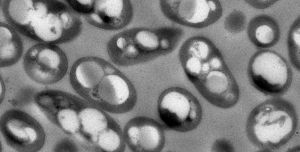En el contexto de la actual de crisis climática y la emergente economía circular, un objetivo fundamental es reemplazar los plásticos actuales basados en fuentes fósiles por alternativas más sostenibles y biodegradables como los PHAs. Estos compuestos, producidos por muchas bacterias, tienen amplias aplicaciones en medicina y en el sector del embalaje, y se consideran una alternativa viable a los plásticos derivados de combustibles fósiles. Los PHAs se almacenan como gránulos de reserva intracelular, sin embargo, su producción presenta un desafío significativo debido a la necesidad de inducir limitación de nutrientes, típicamente nitrógeno, fósforo u oxígeno, en el medio de cultivo para su producción. Esto representa un cuello de botella importante en la producción de PHAs, ya que requiere la implementación de bioprocesos complejos.
En este trabajo liderado por el CSIC se superan en gran medida estos obstáculos. En una primera instancia, se ha conseguido optimizar la producción de PHA reconfigurando el metabolismo bacteriano según predicciones computacionales. Finalmente, utilizando biología sintética, se ha logrado implementar una producción independiente de limitaciones nutricionales, lo que permite implantar bioprocesos más simples y eficientes. En palabras de María Manoli, primera firmante del trabajo y perteneciente al CIB-CSIC, “las factorías bacterianas desarrolladas han mostrado a escala de laboratorio la mayor producción de PHA en relación a la biomasa celular a partir de hidrolizados de PET jamás reportada”. Además, añade, “las cepas desarrolladas fueron capaces de producir cantidades significativas de PHA a partir de otros residuos, como derivados de lignina, un polímero vegetal altamente recalcitrante”.
En su conjunto, “estos resultados representan un avance muy significativo en el abordaje de la actual crisis global ocasionada por la acumulación de plástico en el medio ambiente y muestran cómo un enfoque multidisciplinar, que incluye predicciones computacionales, ingeniería genética y biología sintética permite poner en valor residuos difíciles de procesar en bioplásticos sostenibles y biodegradables”, destaca Nogales. “Este cambio en la producción no solo podría reducir la huella de carbono en la producción de plásticos, sino también contribuir a mitigar la crisis del plástico, que tiene un costo de hasta 600.000 millones de dólares cada año”, remarca.
Este trabajo ha dado lugar a una patente y se ha desarrollado en el contexto de dos proyectos europeos de Horizonte 2020: P4SB, en el que participaron 12 instituciones y empresas de cinco países, y MIX-UP, un proyecto en curso, en colaboración con China, que incluye la participación de 10 instituciones y empresas europeas y cuatro instituciones chinas.
Referencia Científica
Maria-Tsampika Manoli, Álvaro Gargantilla-Becerra, Carlos del Cerro Sánchez, Virginia Rivero-Buceta, M. Auxiliadora Prieto, Juan Nogales. A model-driven approach to upcycling recalcitrant feedstocks in Pseudomonas putida by decoupling PHA production from nutrient limitation. Cell Reports. 2024. DOI: https://doi.org/10.1016/j.celrep.2024.113979






